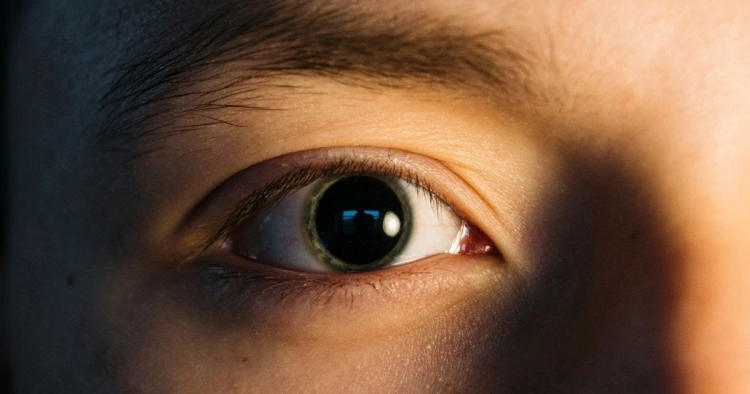What Causes Dilated Pupils?
09 March 2021

What are pupils?
The black centre of the eye is known as the pupil, and it is operated by muscles in your iris (the coloured part of your eye). The pupil's function is to control the amount of light entering the eye, which focuses on the retina (the nerve cells at the back of your eye) so you can see. This usually determines any fluctuations in the size of your pupil. Your pupils are also controlled by the muscles in your iris – the coloured part of your eye. While your two pupils will usually be the same size, pupil size can fluctuate overall. Light, medications and certain diseases can cause pupils to change size, and even how interested or attracted you are to something!
What are dilated pupils?
Dilated pupils are pupils that appear bigger than their usual size.
When there is little light exposure to your eyes, your pupils dilate (get larger) to allow more light in so that you can see surrounding objects better. It is also good to know that your pupils constrict (get smaller) when exposed to bright light to prevent too much light from entering your eyes. Normal pupil size generally ranges from 2 to 4mm in bright light, and 4 to 8 mm in the dark.
A dilated pupil can sometimes still grow smaller in response to bright light, but typically, dilated eyes do not normally respond to light.
Pupil Dilation Causes
There are many factors that can cause large pupils to occur. If your enlarged pupils are not affected by lack of light exposure, it may be because of one of the following reasons.
Drug Use
Your pupils can give off tell-tale signs that you have been consuming illegal drugs due to their effect on them. Drugs such as Cocaine, LSD, and Ecstasy affect the muscle that widens the pupil, slowing how it reacts to light. So even when your eyes are receiving high light exposure, your pupils will remain dilated instead of constricting. Withdrawal from these drugs can also cause your pupils to dilate.
Medicines
As with illegal drugs, legal drugs and medicines can also affect the muscles that control your pupils and cause them to remain dilated when light shines in. These medicines include:
- Antihistamines
- Motion sickness and anti-nausea medication
- Tricyclic antidepressants
- Anti-seizure drugs
- Parkinson's medications such as amantadine and carbidopa-levodopa
- Atropine, which treats problems with heart rhythm, stomach issues, and some types of poisoning
Injury or Disease
A head injury, stroke, or tumour can build pressure inside the brain and damage the muscles in your iris that make your pupils dilate or constrict. An eye injury can also cause the same problems to occur. One or both of your pupils can become stuck in the dilated position and unable to react to light exposure. It is crucial for you to seek medical attention immediately should this happen.
Eye surgery
Here at Ultralase, our vision correction treatments may include using Tropicamide eye drops which will dilate your pupils. One example is our Implantable Contact Lens (a.k.a ICL) surgical treatment. We will administer the eye drops that dilate your pupils, so that we are able to fit an artificial lens that matches your prescription securely behind your iris. You will then be able to live a life with clear vision without the need for glasses/contact lenses. Click here to find out more or book a free consultation to find out if you are suitable for treatment.
Benign episodic unilateral mydriasis
This is a condition where a person experiences irregular episodes of one pupil becoming dilated. It's unusual but harmless (hence the "benign" term) and often accompanied by blurry vision, headache and eye pain. Young women prone to migraines appear to have a higher risk of experiencing benign episodic unilateral mydriasis.
When to worry about dilated pupils
It is essential for you to seek medical attention if your pupils continue to stay dilated and show no reaction to drastic changes to light. It is also important to see a doctor if your pupils look larger than usual after experiencing head trauma, eye injury, sudden dizziness, headache, confusion, balance problems or other symptoms of a possible stroke.
If you notice dilated pupils after you've consumed medication, call the prescribing physician for guidance. In cases other than those described above, contact your optician immediately for advice if you notice your pupils are dilating randomly.
Can stress cause your pupils to dilate?
People often think of stress or anxiety as a mental condition. But anxiety can actually cause a chemical reaction that will cause physical effects on different parts of your body. During periods of intense stress (e.g a panic attack), your entire body goes into fight or flight mode, and the adrenaline rush starts pumping.
Usually, when the fight or flight response mode is triggered, your body is preparing to physically get you out of harm's way. The adrenaline rush causes your pupils to dilate so that you can have the best vision possible to detect any dangers.
Can anger cause dilated pupils?
When people get angry, their emotional state activates the sympathetic branch of their autonomic nervous system. The sympathetic nervous system will trigger the "fight or flight" response. What's different with a person experiencing emotions of anger is that their body is preparing for an attack and wants to be perceived as the dominating threat. The feeling of aggression and the rise of adrenaline will cause your pupils to dilate, which will also contribute to a more frightening appearance.
Back to Blog
